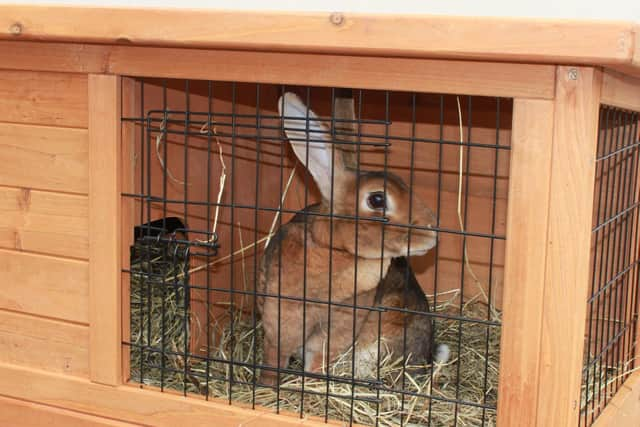Petition urges government to ban the sale of 'cruel' rabbit hutches
and live on Freeview channel 276
They are also calling for new legislation to be introduced to establish national minimum sizes for rabbit houses.
With there not being a legal requirement for the size of houses for pet rabbits, the Rabbit Welfare Association and Fund (RWAF), says 25 per cent of pet rabbits in the UK are being kept in inadequate living condition.
Advertisement
Hide AdAdvertisement
Hide AdSuch conditions, they say, cause fatal health issues such as flystrike and spinal deformaties.


The charity also said the accessibility and mass availability of unsuitable rabbit houses from retailers needs addressing to improve living conditions for rabbits.
Inadequately sized hutches result in a lifetime of pain and suffering for pet rabbits, with research linking cramped hutches to multiple long-term physical and mental health problems, as well as shorter lifespans.
Dr Emma Milne, RWAF Patron and Welfare campaigner said: “Rabbits are one of the most misunderstood and neglected of our pet animals.
Advertisement
Hide AdAdvertisement
Hide Ad"Far too many are kept alone and in totally inadequate hutches. Can you imagine never being able to stand up or stretch out for your whole life? This is nothing short of imprisonment and unnecessary suffering.
“It’s high time shops take the responsibility for that suffering and stop selling anything that isn’t the minimum size. If people don’t have the money or the space to provide for the genuine needs of rabbits then I’m afraid they aren’t the right pet for them."
RWAF said that Inadequately sized rabbit houses have been accepted as the norm due their vast availability online and their cheap price point when, in reality, rabbit hutches were only used in Victorian times when rabbits were bred for meat and hutches were short-term solution, not long-term housing.
The RWAF’s minimum housing recommendation for two average-sized rabbits, which it wants establishing as a national minimum size, is an area of 3m x 2m, and 1m high.
Advertisement
Hide AdAdvertisement
Hide AdPart of this should be a safe, covered space and housing should always be attached to a run – an additional area where rabbits can exercise.
Small rabbit hutches are greater exposed to poor weather conditions and can become extremely cold and wet. Dry space then becomes sparse, forcing rabbits to eat, sleep and go to toilet in the same area, making living conditions dirty and leaving rabbits more prone to painful and deadly diseases, such as chronic urinary tract disease and flystrike.
Richard Saunders, from RWAF, said: "We see many rabbits that have been kept in too small hutches which restrict their movement.
"Sometimes they are able to adapt and thrive in a new, more spacious environment, and to see them making their first ventures into a larger area to explore, run, jump and play is amazing.
Advertisement
Hide AdAdvertisement
Hide Ad"On other occasions, problems caused as a result of small hutches, such as sore hocks, permanent mobility problems, urine scalding and chronic urinary tract disease mean that the outcome is sadly not so bright."
Some of the issues caused by living in small hutches are:
Spinal deformities: Caused by the inability to stand up straight for hours at a time.
Obesity: Caused by the inability to exercise, increasing risk of disease and death.
Flystrike: An extremely painful and deadly disease, this is caused when rabbits can’t clean themselves properly due to obesity or confined spaces. Flies, attracted by unclean bottoms, lay eggs in rabbits’ fur, which then hatch into maggots that eat the rabbit’s flesh.
Advertisement
Hide AdAdvertisement
Hide AdOvergrown nails: Unable to naturally wear down nails by foraging and digging, this results in nails being torn, ripped out of the nail bed and toes being dislocated or broken.
Aggressive behavioural and depression: A combination of stress, loneliness, boredom and frustration causes rabbits to develop negative behavioural issues, aggression and severe depression.
The rabbit welfare charity and its veterinary associates are urging rabbit owners and passionate animal welfare campaigners to sign and share the petition to raise awareness of one of the biggest issues negatively impacting the lives of pet rabbits throughout the UK.
You can sign the petition here.